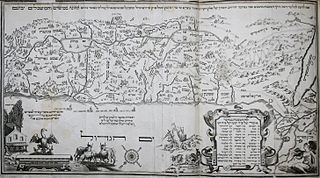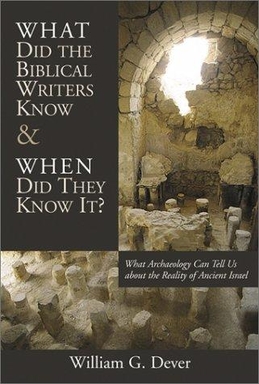
The Israelites were a group of Semitic-speaking tribes in the ancient Near East who, during the Iron Age, inhabited a part of Canaan.
The historicity of the Bible is the question of the Bible's relationship to history—covering not just the Bible's acceptability as history but also the ability to understand the literary forms of biblical narrative. One can extend biblical historicity to the evaluation of whether or not the Christian New Testament is an accurate record of the historical Jesus and of the Apostolic Age. This tends to vary depending upon the opinion of the scholar.

William Foxwell Albright was an American archaeologist, biblical scholar, philologist, and expert on ceramics. He is considered "one of the twentieth century's most influential American biblical scholars."
Kenneth Anderson Kitchen is a British biblical scholar, Ancient Near Eastern historian, and Personal and Brunner Professor Emeritus of Egyptology and honorary research fellow at the School of Archaeology, Classics and Egyptology, University of Liverpool, England. He specialises in the ancient Egyptian Ramesside Period, and the Third Intermediate Period of Egypt, as well as ancient Egyptian chronology, having written over 250 books and journal articles on these and other subjects since the mid-1950s. He has been described by The Times as "the very architect of Egyptian chronology".

The Tel Dan Stele is a fragmentary stele containing a Canaanite inscription which dates to the 9th century BCE. It is notable for possibly being the most significant and perhaps the only extra-biblical archeological reference to the house of David.

Biblical archaeology is an academic school and a subset of Biblical studies and Levantine archaeology. Biblical archaeology studies archaeological sites from the Ancient Near East and especially the Holy Land, from biblical times.

The United Monarchy is a political entity described in the deuteronomistic history of the Hebrew Bible as, under the reigns of Saul, David, and Solomon, encompassing the territories of both the later Kingdom of Judah and Samarian Kingdom of Israel. Whether the United Monarchy existed is a matter of ongoing academic debate, and scholars remain divided between those who support the historicity of the biblical narrative, those who doubt or dismiss it, and those who support the kingdom's theoretical existence while maintaining that the biblical narrative is exaggerated. Proponents of the kingdom's existence traditionally date it to between c. 1047 BCE and c. 930 BCE.
The patriarchal age is the era of the three biblical patriarchs, Abraham, Isaac and Jacob, according to the narratives of Genesis 12–50. It is preceded in the Bible by the primeval history and followed by The Exodus.
John Van Seters is a Canadian scholar of the Hebrew Bible and the Ancient Near East. Currently University Distinguished Professor Emeritus at the University of North Carolina, he was formerly James A. Gray Professor of Biblical Literature at UNC. He took his Ph.D. at Yale University in Near Eastern Studies (1965) and a Th.D. h.c. from the University of Lausanne (1999). His honours and awards include a Guggenheim Fellowship, an NEH fellowship, an ACLS Fellowship, and research fellowships at Oxford, Cambridge, Katholieke Universiteit Leuven, and National Research Foundation of South Africa. His many publications include The Hyksos: A New Investigation (1966); Abraham in History and Tradition (1975); In Search of History ; The Edited Bible (2006); and The Biblical Saga of King David (2009).

The Bible Unearthed: Archaeology's New Vision of Ancient Israel and the Origin of Its Sacred Texts, a book published in 2001, discusses the archaeology of Israel and its relationship to the origins and content of the Hebrew Bible. The authors are Israel Finkelstein, Professor of Archaeology at Tel Aviv University, and Neil Asher Silberman, an archaeologist, historian and contributing editor to Archaeology Magazine.
Criticism of the Bible is an interdisciplinary field of study concerning the factual accuracy of the claims and the moral tenability of the commandments made in the Bible, the holy books of Christianity, Judaism, and other religions. Devout Christians have long regarded their Bible as the perfect word of God. Scholars and scientists have endeavored for centuries to scrutinise biblical texts to establish their origins and validity. In addition to concerns about ethics in the Bible, about biblical inerrancy, or about the historicity of the Bible, there remain some questions of biblical authorship and as to what material to include in the biblical canon.
William Gwinn Dever is an American archaeologists, scholar, historian, semiticist, and theologian. He is an active scholar of the Old Testament, and historian, specialized in the history of the Ancient Near East and the ancient kingdoms of Israel and Judah in biblical times. He was Professor of Near Eastern Archaeology and Anthropology at the University of Arizona in Tucson from 1975 to 2002. He is a Distinguished Professor of Near Eastern Archaeology at Lycoming College in Pennsylvania.
Biblical minimalism, also known as the Copenhagen School because two of its most prominent figures taught at Copenhagen University, is a movement or trend in biblical scholarship that began in the 1990s with two main claims:
- that the Bible cannot be considered reliable evidence for what had happened in ancient Israel; and
- that "Israel" itself is a problematic subject for historical study.
Thomas L. Thompson is an American-born Danish biblical scholar and theologian. He was professor of theology at the University of Copenhagen from 1993 to 2009. He currently lives in Denmark.

What Did the Biblical Writers Know and When Did They Know It? What Archaeology Can Tell Us about the Reality of Ancient Israel is a 2001 book by biblical scholar and archaeologist William G. Dever detailing his response to the claims of minimalists to the historicity and value of the Hebrew Bible. The book was also conceived as a response to Thomas L. Thompson's minimalist book The Bible in History.
The Historicity of the Patriarchal Narratives: The Quest for the Historical Abraham is a book by biblical scholar Thomas L. Thompson, Professor of Old Testament Studies at the University of Copenhagen.

Who Were the Early Israelites and Where Did They Come From? is a book by American biblical scholar and archaeologist William G. Dever.
Biblical archaeology, occasionally known as Palestinology, is the school of archaeology which concerns itself with the biblical world. In the academic setting it serves as an adjunct to biblical studies, providing the historical, cultural, and linguistic context to scripture.
"The Bible's Buried Secrets" is a Nova program that first aired on PBS, on November 18, 2008. According to the program's official website: "The film presents the latest archaeological scholarship from the Holy Land to explore the beginnings of modern religion and the origins of the Hebrew Bible, also known as the Old Testament. This archaeological detective story tackles some of the biggest questions in biblical studies: Where did the ancient Israelites come from? Who wrote the Bible, when, and why? How did the worship of one God—the foundation of modern Judaism, Christianity, and Islam—emerge?"
Philip R. Davies (1945–2018) was a British biblical scholar. He was Professor Emeritus of biblical studies at the University of Sheffield, England. In the late 1990s, he was the Director for the Centre for the Study of the Dead Sea Scrolls. He was also the publisher and editorial director of Sheffield Academic Press. He was the author of books and articles on ancient Israelite history and religion, including Scribes and Schools (1998) in the Library of Ancient Israel. Davies promoted the theory of cultural memory. He and David Clines edited the Journal for the Study of the Old Testament and its Supplement Series.